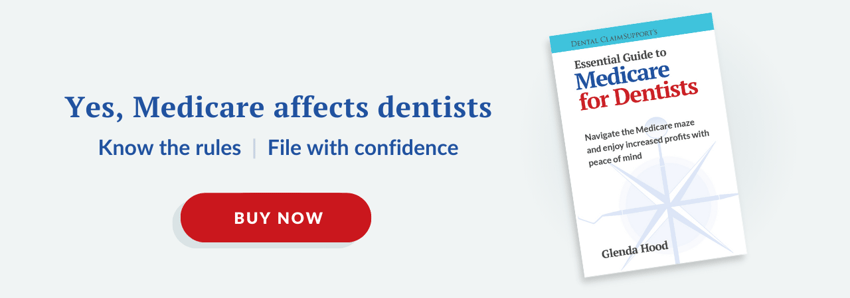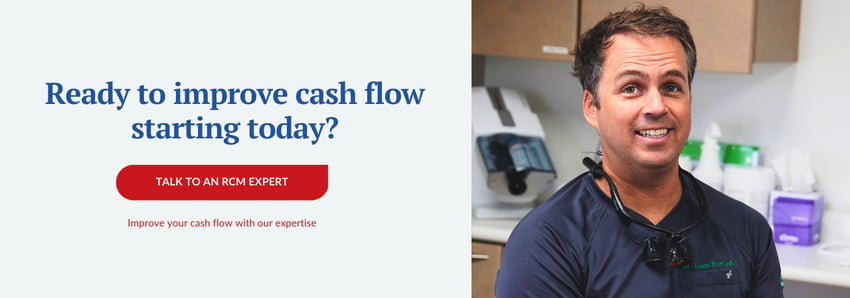In-network or out-of-network: Pros and cons for your dental practice


Whether you’re starting a brand new dental practice, or looking to make some changes at your current one, there’s a question every dentist has at some point:
Should my dental practice be in-network or out-of-network with dental insurance?
Both options can affect your claims and billing process differently. You have to consider what’s going to work best with the billing process you want or have in mind. You also need to consider what is going to work best for the people or service you plan to hire to handle that process.
Dental ClaimSupport helps both in-network and out-of-network dentists with their claims processes. Through ten years of helping both types of dentists with their insurance claims, we can see the pros and cons of both options.
You will walk away from this article understanding the pros and cons of your practice being in-network versus out-of-network with insurance. We’ll cover what each option means, and what the benefits and drawbacks are.
You will then be able to make an informed decision on which best suits the needs of your practice.
What does it mean to be an in-network dental practice?
When your dental practice is in-network with insurance companies, it means you are entering a contractual agreement with them. This makes your practice a “participating provider.” The contract you’ll enter will define the patients who come into your practice, your claims reimbursement process, and the rate of your fees.
Patients covered by the insurance your practice is in-network with can only visit those dentists to receive discounts on services. Let’s get into the upsides of your practice being in-network with insurance companies.
Pros of your dental practice being in-network
Many dental practices choose to be in-network with insurance because of the access to patients it gives them. Patients enjoy going to in-network dentists because of the affordability and ease of finding a dentist that accepts their insurance.
Here are the benefits to your practice if you choose to be in-network:
- Free marketing and advertising. Being in-network with insurance means that the insurance company will promote your practice for free. Patients will easily be able to find your practice in their insurance portal. This is great for a small practice trying to grow its patient base.
- More patients. Because you’re so easily accessible AND being promoted by the insurance you’re in-network with, you’re going to have plenty of patients. This means your schedule will stay full and you can bring in more money for the practice. If your goal is to increase quantity, being in-network is probably the best choice for your practice.
Now let’s get into the cons of your dental practice being in-network with insurance.

Cons of your dental practice being in-network
Let’s be real, you signed a contractual agreement with a dental insurance company. Insurance companies aren’t exactly your ally when it comes to getting the money you’ve earned. When insurance has more input in how your practice is run and what patients you accept, some drawbacks can occur.
Here are the cons to your practice being in-network:
- Fees are pre-established with the insurance company. When you go in-network with a dental practice, you agree on established fees for your services. We use the term “agree” loosely. It’s hard to negotiate these fees. Typically insurance will just tell you what the fee is. This can be a drawback for dentists who want to charge more for their services.
- Less time to spend on patients. Remember how we mentioned the increase in your patient base? Well, sometimes quantity can take away from quality. When you have back-to-back patients, you might feel pressed for time as a dentist or a front desk team member. This can lead to lower quality of patient care.
There’s a reason being in-network is such a common option among dentists - accessibility and affordability for patients. But that’s not always a priority for every dental practice. Let’s dive into what it means to be out-of-network as a dental practice.
What does it mean to be an out-of-network dental practice?
As you probably guessed, an out-of-network dentist is not in any kind of contractual agreement with insurance companies. You still accept insurance, but you can charge your full fee to patients. And you can decide the type of care you give to patients without the input of the insurance company.
There are definitely some big benefits to being out-of-network as a dentist.
Pros of your dental practice being out-of-network
One of the biggest, overarching pros to being out-of-network is that you retain control over every part of your practice. The insurance company has no say over what you do or what patients you accept. Sure, you still have to deal with insurance. But not at the same rate as in-network dentists.
Here are the pros of being out-of-network as a dentist:
- You can decide your own rates for service. Controlling your own fees can feel really liberating for dentists. You worked hard and went to dental school - the insurance companies didn’t! Being able to decide what your services are worth is a huge benefit to being out-of-network. This is especially appealing if you offer specialty services that aren’t widely available in your area.
- You can become a fee-for-service dentist. For a lot of dentists, becoming a fee-for-service dental practice is the ideal state. And when you’re out-of-network, you can transition to this billing model. You will collect your full fee from your patient after their procedure, then send a claim on their behalf for them to be reimbursed by their insurance.
Control over your practice is invaluable. But let’s get into the drawbacks of your dental practice being out-of-network.
Cons of your dental practice being out-of-network
Going out-of-network can feel a little overwhelming for some dental teams, especially if they don’t know where to start on their pricing. It also makes your practice harder for patients to find, and even too expensive for some patients.
Here are the cons of your dental practice being out of network:
- Less accessible for some patients. If your goal is to be accessible and affordable for patients, being out-of-network might not be the right decision for you. Of course, you could decide to make your fees as low as you want. But realistically, to run a dental practice and have quality equipment - that’s not really possible. You will have to spend more time marketing your practice as well if you’re trying to grow your patient base.
- Because fees tend to be higher - you will have to spend more time on patient billing. Does your team have time to sit down with patients and explain their benefits to them? Do they have time to go over why your fees are priced the way they are? This is something successful out-of-network dental teams do. Because the fees are higher, collecting the right amount from patients can get trickier. You’ll need to have a streamlined patient billing process. And this will require more time from your team.
If your goal is to increase your patient base and be an affordable, accessible option - being out-of-network is likely not the right choice for you.
Curious how outsourced dental billing can benefit you, no matter what kind of practice you are in?
There are plenty of appeals and drawbacks to being in-network and out-of-network with dental insurance. Many of them relate to how you collect from patients, and how your patient experience goes. You just have to figure out which is a better fit for your practice, based on what your goals are.
No matter which you choose, you will always need someone responsible for your insurance billing. Dental ClaimSupport is a valuable resource for practices that hope to collect close to 100% of their insurance claims.
To learn more about how outsourced dental billing can benefit your practice - no matter what specialty or contract with insurance - visit our Learning Center.
Related Posts
Dental revenue resources from Dental Claim Support


